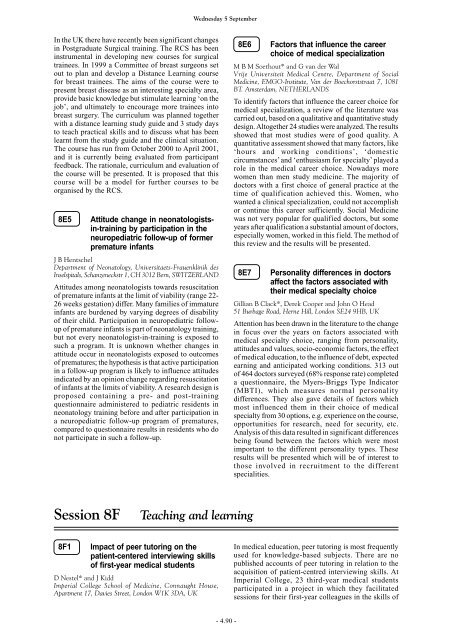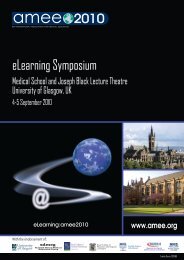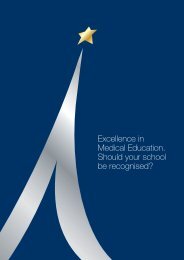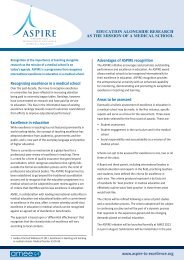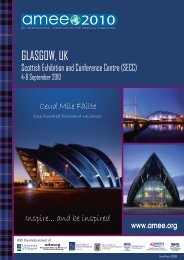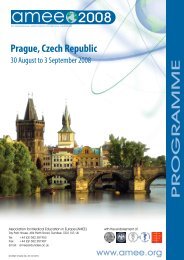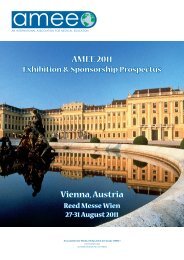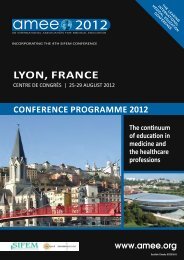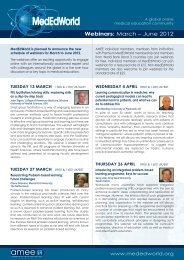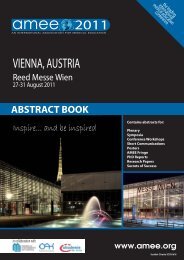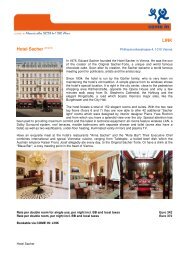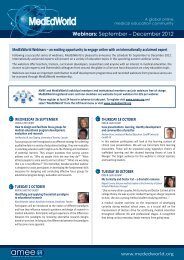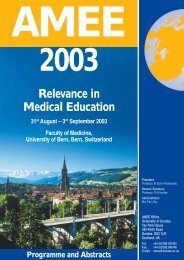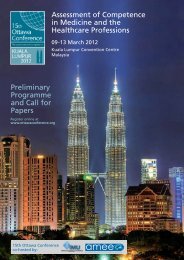AMEE Berlin 2002 Programme
AMEE Berlin 2002 Programme
AMEE Berlin 2002 Programme
Create successful ePaper yourself
Turn your PDF publications into a flip-book with our unique Google optimized e-Paper software.
In the UK there have recently been significant changes<br />
in Postgraduate Surgical training. The RCS has been<br />
instrumental in developing new courses for surgical<br />
trainees. In 1999 a Committee of breast surgeons set<br />
out to plan and develop a Distance Learning course<br />
for breast trainees. The aims of the course were to<br />
present breast disease as an interesting specialty area,<br />
provide basic knowledge but stimulate learning ‘on the<br />
job’, and ultimately to encourage more trainees into<br />
breast surgery. The curriculum was planned together<br />
with a distance learning study guide and 3 study days<br />
to teach practical skills and to discuss what has been<br />
learnt from the study guide and the clinical situation.<br />
The course has run from October 2000 to April 2001,<br />
and it is currently being evaluated from participant<br />
feedback. The rationale, curriculum and evaluation of<br />
the course will be presented. It is proposed that this<br />
course will be a model for further courses to be<br />
organised by the RCS.<br />
8E5 Attitude change in neonatologistsin-training<br />
by participation in the<br />
neuropediatric follow-up of former<br />
premature infants<br />
J B Hentschel<br />
Department of Neonatology, Universitaets-Frauenklinik des<br />
Inselspitals, Schanzeneckstr 1, CH 3012 Bern, SWITZERLAND<br />
Attitudes among neonatologists towards resuscitation<br />
of premature infants at the limit of viability (range 22-<br />
26 weeks gestation) differ. Many families of immature<br />
infants are burdened by varying degrees of disability<br />
of their child. Participation in neuropediatric followup<br />
of premature infants is part of neonatology training,<br />
but not every neonatologist-in-training is exposed to<br />
such a program. It is unknown whether changes in<br />
attitude occur in neonatologists exposed to outcomes<br />
of prematures; the hypothesis is that active participation<br />
in a follow-up program is likely to influence attitudes<br />
indicated by an opinion change regarding resuscitation<br />
of infants at the limits of viability. A research design is<br />
proposed containing a pre- and post-training<br />
questionnaire administered to pediatric residents in<br />
neonatology training before and after participation in<br />
a neuropediatric follow-up program of prematures,<br />
compared to questionnaire results in residents who do<br />
not participate in such a follow-up.<br />
Wednesday 5 September<br />
Session 8F Teaching and learning<br />
8F1 Impact of peer tutoring on the<br />
patient-centered interviewing skills<br />
of first-year medical students<br />
D Nestel* and J Kidd<br />
Imperial College School of Medicine, Connaught House,<br />
Apartment 17, Davies Street, London W1K 3DA, UK<br />
- 4.90 -<br />
8E6 Factors that influence the career<br />
choice of medical specialization<br />
M B M Soethout* and G van der Wal<br />
Vrije Universiteit Medical Centre, Department of Social<br />
Medicine, EMGO-Institute, Van der Boechorststraat 7, 1081<br />
BT. Amsterdam, NETHERLANDS<br />
To identify factors that influence the career choice for<br />
medical specialization, a review of the literature was<br />
carried out, based on a qualitative and quantitative study<br />
design. Altogether 24 studies were analyzed. The results<br />
showed that most studies were of good quality. A<br />
quantitative assessment showed that many factors, like<br />
‘hours and working conditions’, ‘domestic<br />
circumstances’ and ‘enthusiasm for specialty’ played a<br />
role in the medical career choice. Nowadays more<br />
women than men study medicine. The majority of<br />
doctors with a first choice of general practice at the<br />
time of qualification achieved this. Women, who<br />
wanted a clinical specialization, could not accomplish<br />
or continue this career sufficiently. Social Medicine<br />
was not very popular for qualified doctors, but some<br />
years after qualification a substantial amount of doctors,<br />
especially women, worked in this field. The method of<br />
this review and the results will be presented.<br />
8E7 Personality differences in doctors<br />
affect the factors associated with<br />
their medical specialty choice<br />
Gillian B Clack*, Derek Cooper and John O Head<br />
51 Burbage Road, Herne Hill, London SE24 9HB, UK<br />
Attention has been drawn in the literature to the change<br />
in focus over the years on factors associated with<br />
medical specialty choice, ranging from personality,<br />
attitudes and values, socio-economic factors, the effect<br />
of medical education, to the influence of debt, expected<br />
earning and anticipated working conditions. 313 out<br />
of 464 doctors surveyed (68% response rate) completed<br />
a questionnaire, the Myers-Briggs Type Indicator<br />
(MBTI), which measures normal personality<br />
differences. They also gave details of factors which<br />
most influenced them in their choice of medical<br />
specialty from 30 options, e.g. experience on the course,<br />
opportunities for research, need for security, etc.<br />
Analysis of this data resulted in significant differences<br />
being found between the factors which were most<br />
important to the different personality types. These<br />
results will be presented which will be of interest to<br />
those involved in recruitment to the different<br />
specialities.<br />
In medical education, peer tutoring is most frequently<br />
used for knowledge-based subjects. There are no<br />
published accounts of peer tutoring in relation to the<br />
acquisition of patient-centred interviewing skills. At<br />
Imperial College, 23 third-year medical students<br />
participated in a project in which they facilitated<br />
sessions for their first-year colleagues in the skills of


